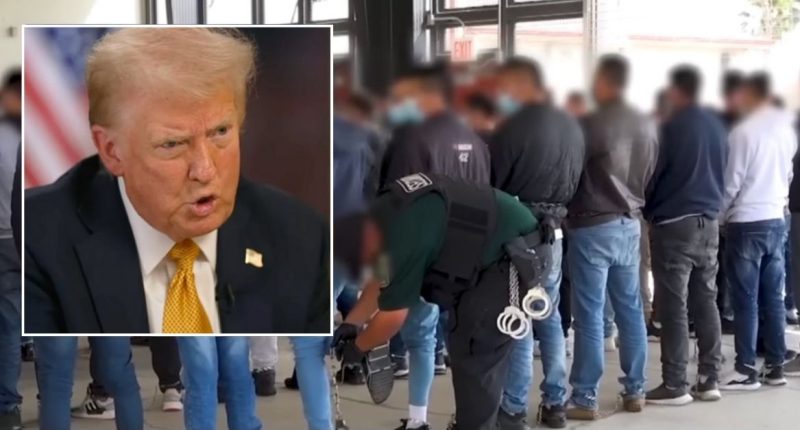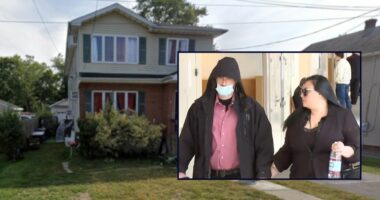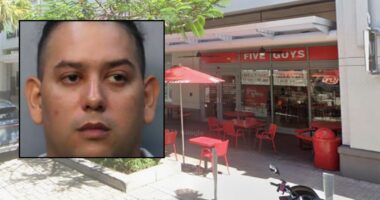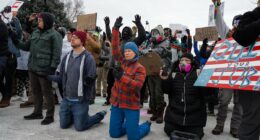Share this @internewscast.com
Inset: President-elect Donald Trump on “Meet the Press” Sunday, Dec. 8, 2024 (NBC News/YouTube). Background: U.S. Immigration and Customs Enforcement conducting a raid (Fox News/YouTube).
A California appeals court criticized the Trump administration for failing to provide any evidence—”not even a bald assertion”—to suggest that undocumented immigrants are found and looking for jobs in “any of the public places or types of businesses” where U.S. Immigration and Customs Enforcement (ICE) has been carrying out “roving patrols” and making arrests recently.
The U.S. Court of Appeals for the 9th Circuit admonished Justice Department lawyers in a 61-page decision on Friday, in which the panel refused a DOJ plea to temporarily lift a lower court judge’s injunction that stopped “discriminatory” ICE raids from occurring in the Los Angeles area and other parts of Southern California. On July 11, U.S. District Judge Maame Ewusi-Mensah Frimpong prohibited ICE agents from detaining people without reasonable suspicion and violating the Fourth Amendment’s protection against unreasonable government seizures.
On Friday, the 9th Circuit’s panel of three judges concurred with the district court that the Trump administration was making seizures based on four criteria: apparent race or ethnicity; speaking Spanish or English with an accent; specific locations; and the type of job one holds. Even when these elements are combined, they “describe only a broad profile” and do not establish reasonable suspicion for any particular stop, the panel noted.
“Defendants select specific public places and businesses because their ‘past experiences’ suggest that illegal immigrants are present and seeking work there,” the 9th Circuit cited from Frimpong’s order.
“Defendants, however, offer no evidence—not even a bald assertion—that any of the public places or types of businesses they are focusing on are predominantly or exclusively used by individuals illegally in the country,” the joint opinion from U.S. Circuit Judges Ronald M. Gould and Marsha S. Berzon, both appointed by Bill Clinton, and U.S. Circuit Judge Jennifer Sung, appointed by Joe Biden, stated. “Therefore, merely being at a business (like a carwash) or another location (such as a bus stop) ‘does little to arouse reasonable suspicion,’ even when combined with officers’ knowledge that illegal immigrants have been present or sought work there.”
Like location, the 9th Circuit said the “type of work one does” is marginally relevant to establishing reasonable suspicion, “even if it is work commonly performed by immigrants without legal status.” An employer hiring a large number of undocumented workers also does not create reasonable suspicion as to each individual employee, per the appellate court.
“Defendants argue that, with more time, they will be able to prove that ‘reasonable suspicion did exist’ for some of the stops described in the record,” the 9th Circuit pointed out. “If, as Defendants suggest, they are not conducting stops that lack reasonable suspicion, they can hardly claim to be irreparably harmed by an injunction aimed at preventing a subset of stops not supported by reasonable suspicion.”
The Trump administration asked the 9th Circuit last month for permission to continue warrantless arrests in Southern California as part of its controversial immigration enforcement efforts.
In a 51-page filing, the DOJ requested emergency relief in the form of an immediate administrative stay, as well as a broader stay pending appeal of the underlying case, to pause the temporary restraining order issued by Frimpong, a Joe Biden appointee. The crux of the dispute has been both the factual way ICE agents are conducting immigration sweeps in the nation’s second largest city and the executive branch’s basic legal authority to conduct such sweeps. One of the government’s central arguments is that it was not given enough time to prepare.
The ACLU and other advocacy groups suing Homeland Security and Secretary Kristi Noem on behalf of individuals who were allegedly stopped and arrested during ICE raids in Los Angeles have propped up Frimpong’s order and praised the lower court for reviewing a “mountain of evidence” documenting the government’s alleged practice of violating the Fourth Amendment with its raids.
The Trump administration has argued that the TRO is “confusing” and a “vague follow-the-law injunction,” and therefore “will have a chilling effect” on immigration enforcement.
The 9th Circuit stated that Frimpong’s order “cures it,” per the Friday ruling.
“Defendants can no longer profess to be confused about whether the TRO prohibits them from considering the four factors at all — it does not,” the panel said, later adding: “[W]e conclude that Defendants have failed to establish that they will be ‘chilled’ from their enforcement efforts at all, let alone in a manner that constitutes the ‘irreparable injury’ required to support a stay pending appeal.”
















